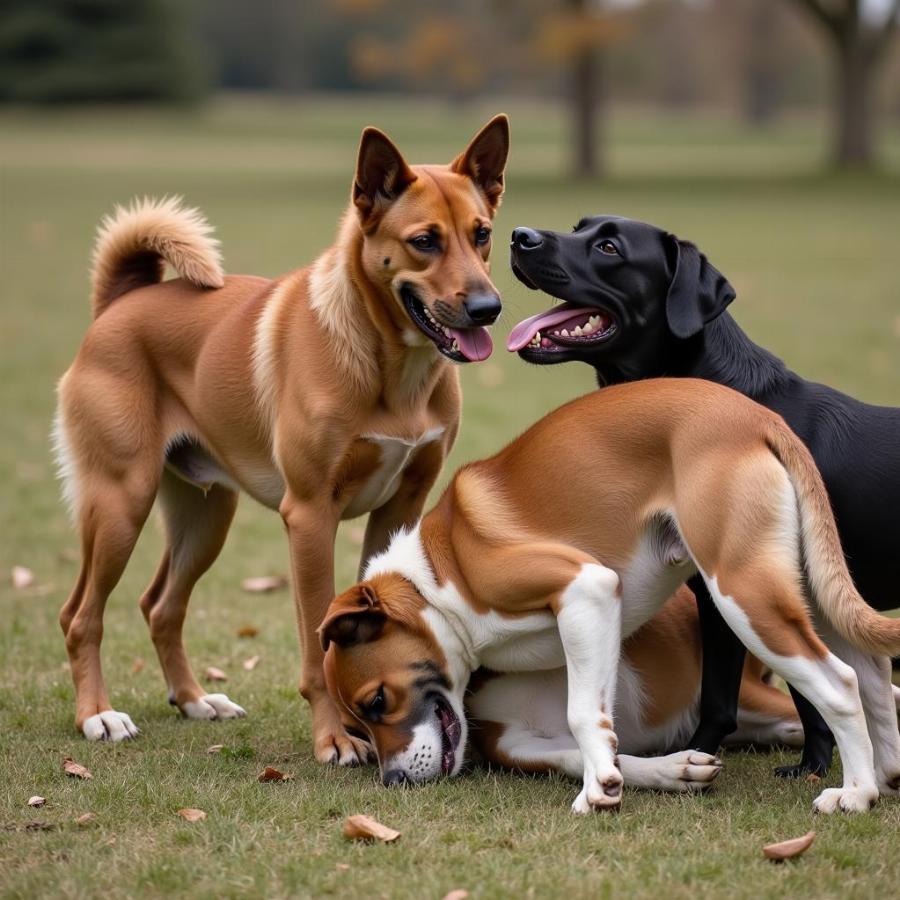Mr. Orange, the undercover cop in Quentin Tarantino’s Reservoir Dogs, isn’t a dog, but the film’s intense loyalty dynamics and pack mentality raise intriguing parallels to the canine world. This article explores these connections, delving into the complex social structures of both dog packs and human groups, and examining how these dynamics influence behavior, trust, and betrayal. We’ll also touch upon how understanding these dynamics can enhance your relationship with your own canine companion.
Pack Mentality in Reservoir Dogs and Dog Packs
Both Reservoir Dogs and dog packs showcase complex hierarchies and power struggles. Mr. Orange infiltrates a group of criminals, much like a new dog entering an established pack. He must navigate a delicate balance of loyalty and deception, mimicking the careful social interactions observed in canine groups. Just as dogs rely on subtle cues to establish dominance and submission, Mr. Orange carefully chooses his words and actions to gain acceptance. This constant negotiation for status and belonging reflects the intricate social dance within both human and canine groups.
Loyalty and Betrayal: A Canine Perspective
Dogs, known for their unwavering loyalty, offer a stark contrast to the betrayal and mistrust that permeate Reservoir Dogs. While Mr. Orange ultimately betrays his newfound “pack,” dogs typically exhibit strong bonds with their pack members, both canine and human. This inherent loyalty raises the question: what happens when a dog’s pack turns on them? While dogs rarely experience the calculated betrayal seen in the film, understanding canine social dynamics can help us recognize and address situations where a dog might feel threatened or insecure within its family unit.
 Dogs Demonstrating Pack Hierarchy
Dogs Demonstrating Pack Hierarchy
Building Trust and Understanding with Your Dog
The complex relationships in Reservoir Dogs highlight the importance of trust and communication, elements crucial for a strong bond with your canine companion. While dogs don’t engage in elaborate heists or undercover operations, they rely on consistent leadership and clear communication to feel secure. Just as Mr. Orange craved acceptance, your dog needs to feel like a valued member of your family “pack.” Building this trust involves understanding your dog’s individual personality, providing consistent training, and fostering a positive and supportive environment.
Communicating Effectively with Your Canine Companion
Effective communication with your dog goes beyond verbal commands. Dogs communicate primarily through body language, and learning to interpret these subtle cues can deepen your understanding of their needs and emotions. Recognizing signs of stress, fear, or excitement allows you to respond appropriately, strengthening the bond and building mutual trust. This understanding of canine communication contrasts sharply with the miscommunication and mistrust that ultimately lead to the tragic events in Reservoir Dogs.
Conclusion: Mr. Orange and the Lessons for Dog Owners
While Mr. Orange’s story is a fictional tale of betrayal and violence, it offers an interesting lens through which to examine pack dynamics and the importance of trust. Although the comparison between a criminal underworld and the world of dogs might seem unconventional, it underscores the fundamental need for belonging and security present in both human and canine societies. By understanding these dynamics, we can build stronger, more fulfilling relationships with our canine companions, ensuring they always feel safe, loved, and valued members of our pack.
FAQ: Dogs and Pack Mentality
- Do all dogs have a pack mentality? Yes, all dogs, regardless of breed or size, retain some aspects of their ancestral pack instincts.
- How can I establish myself as the “pack leader” for my dog? Consistent training, clear communication, and providing a structured environment helps your dog understand its place within the family.
- Is it normal for dogs to display dominance behaviors within the family? Yes, it’s natural for dogs to establish a social hierarchy within their family. However, excessive dominance should be addressed through training and behavior modification.
- Can dogs experience betrayal? While dogs may not experience betrayal in the same complex way humans do, they can certainly feel confused and insecure if their trust is broken.
- How can I help my dog feel secure within its “pack”? Provide consistent routines, positive reinforcement, and plenty of love and attention.
Beaut Dogs: Your Ultimate Resource for Canine Companionship
Beaut Dogs is the premier online destination for dog lovers, offering comprehensive and reliable information on all aspects of canine care, from breed selection to nutrition and training. We are committed to providing expert advice and valuable resources to help you build a strong and loving relationship with your furry friend. When you need help, contact us at Email: [email protected] to get detailed and accurate answers from Beaut Dogs.